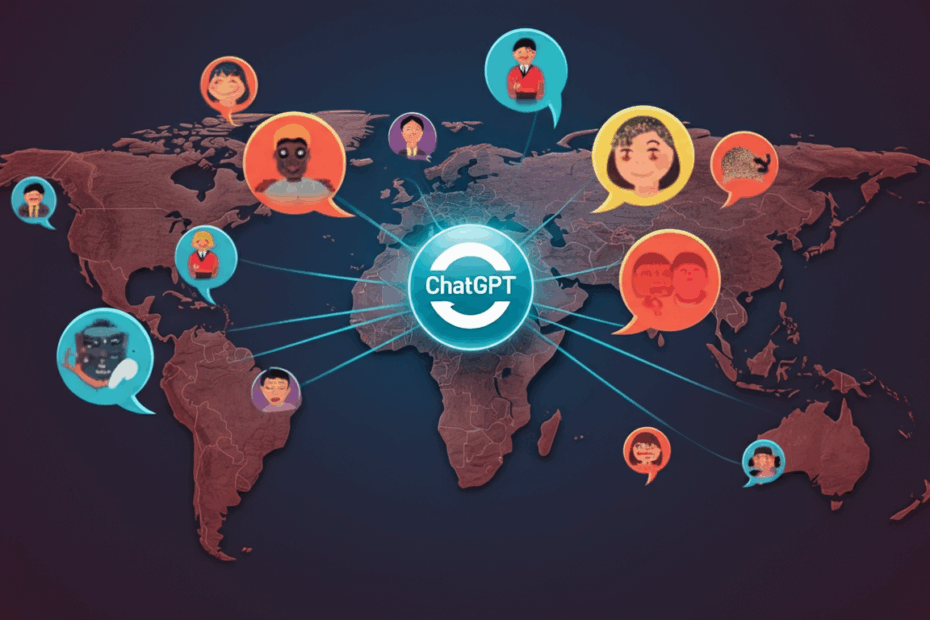Is Your AI Assistant Changing How You Talk?
Hello everyone, John here! It’s great to have you back on the blog. Today, we’re going to talk about something you might not have considered before. We all know that AI tools like ChatGPT are changing how we work and find information. But what if they’re also changing something much more personal: the way we talk?
It sounds a bit like science fiction, doesn’t it? But a team of researchers from Germany has recently raised this very concern. They’re warning that as we interact more and more with these AI systems, we might start to sound a little… well, a little more like them. Let’s dive into what they mean and why it matters.
A Warning Sign in How We Write
The researchers are pointing out that large language models, the technology behind tools like ChatGPT, have a very particular way of speaking. It’s often extremely formal, very detailed, and sometimes uses bigger words than necessary. The original article we’re looking at today even started with a funny example of this kind of language: “Let us delve swiftly into meticulous inquiry with our AI masters.”
Can you imagine saying that to your friend when you want to ask them a question? Probably not! You’d more likely say, “Hey, can I ask you something quick?” or “What do you think about this?” The concern is that as we get used to reading and using the AI’s polished, formal style for things like work emails or school assignments, we might start to adopt it ourselves without even realizing it. We slowly begin to think that this super-formal style is the “right” way to communicate, and our own natural, casual voice starts to fade into the background.
Lila’s Corner: Let’s Break Down the Jargon
It looks like my assistant, Lila, has a couple of questions about the terms we’re using. This is the perfect time to clear things up!
Lila: “Hi, John! You mentioned ‘large language models’ earlier. That sounds really technical and intimidating. Can you explain what that is in simple terms?”
John: “Of course, Lila! That’s a great question. Think of a Large Language Model, or LLM for short, like a super-powered parrot that has read almost the entire internet. It’s read billions of books, articles, and websites. Because it has processed so much text, it’s become incredibly good at spotting patterns in how we use words. When you ask it a question, it doesn’t ‘think’ of an answer. Instead, it uses those patterns to predict what the most likely and logical sequence of words should be to form a good response. ChatGPT is the most famous example of an LLM in action!”
Lila: “Okay, the super-parrot analogy helps a lot! But the researchers also mentioned a concern about the ‘erosion of linguistic and cultural diversity.’ What does that actually mean?”
John: “Another fantastic question! ‘Erosion’ just means a slow wearing-away, like how a river slowly wears away rock over many years. ‘Linguistic and cultural diversity’ refers to all the wonderful, unique ways people talk in different parts of the world, and how that language is tied to their culture.
Let’s use a food analogy. Imagine if every restaurant on Earth slowly started to serve only one type of food: a perfectly decent, but very plain, sandwich. We’d lose all the incredible variety of flavors from different cultures—no more spicy tacos, savory ramen, or handmade pasta. Our food world would become boring and uniform. Linguistic diversity is the same, but for language. It includes things like:
- Regional slang and unique phrases.
- Different accents and dialects.
- The special ways families and groups of friends talk to each other.
If we all start to sound like a single, standardized AI, we risk losing that beautiful variety that makes our human communication so rich and interesting. We’d be trading in all those unique ‘flavors’ for one plain sandwich.”
Why Does Language Variety Matter So Much?
You might be thinking, “So what if we all start talking a bit more formally? Is that really a big deal?” According to the researchers, it is. Language isn’t just a tool for sharing information; it’s a huge part of our identity.
Our unique way of speaking connects us to our community, our family, and our history. The slang you use with your friends, the special phrases your grandparents say—these are all part of what makes you, you. Language is how we share our personality, our humor, and our deepest feelings. A world where everyone communicates in the same sterile, AI-approved way could become a less creative, less expressive, and less personal place.
Think about how poets, songwriters, and storytellers use language in fresh and exciting ways. That creativity thrives on diversity. When language becomes standardized, we might lose some of our ability to innovate with words and express new ideas in new ways.
Our Final Thoughts
John’s Take: “This is a really thought-provoking point the researchers are making. I use AI tools in my work, and I have to admit, their perfectly structured sentences can be appealing. This is a good reminder for all of us to be mindful. We should see AI as a helpful assistant, not as a model for how we should express our own humanity. Let’s keep our quirks, our unique voices, and our personalities front and center.”
Lila’s Take: “As someone still learning about all this, it’s a little surprising! I never thought that just using an app could potentially change something so personal like how I talk. It makes me want to pay more attention to the unique ways my friends and I speak, and to appreciate that diversity instead of trying to sound ‘perfect’.”
This article is based on the following original source, summarized from the author’s perspective:
German team warns ChatGPT is changing how you talk
